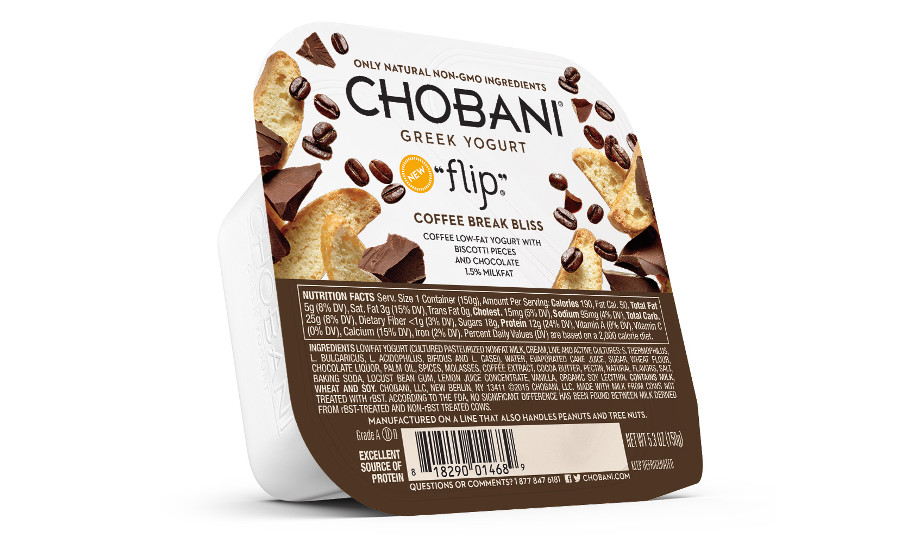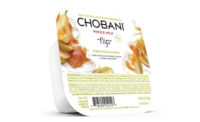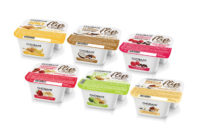When Norwich, N.Y-based Chobani launched its Flip product two years ago (a two-chambered package with Greek yogurt on one side and “mix-ins” like coffee beans, oats or glazed pumpkin seeds on the other) it was with little fanfare.
This low-key approach allowed the decade-old company to tinker with a product that Chobani wanted to make sure it got just right before making a media full-court press, said Michael Gonda, vice president of communications, who was in Chicago for the Food + Wine Festival over the weekend.
On the strength of a media campaign that began in June, along with new, more thematically positioned packaging, case sales of Flip have more than quadrupled from 150,000 in 2014 to 650,000 this year, Gonda said. Given that consumers are increasingly well aware of Chobani’s general attributes, “We reached the point where we could celebrate the product in a lifestyle space,” he said in an exclusive interview with Dairy Foods. Chobani was this magazine's Processor of the Year in 2012.
The company’s plant in Twin Falls, Idaho is running 24-7 to keep up with demand for a product that’s designed to make consumers think of Chobani as a snack, with flavors like Coffee Break Bliss (coffee low-fat yogurt with biscotti pieces and chocolate) and Peanut Butter Dream (vanilla yogurt with a mix of honey roasted peanuts and peanut butter clusters), in addition to its traditional designation as a breakfast item, Gonda said.
“It’s a stake in the ground for that day-part,” he said. “We’re thrilled. It far exceeded our expectations. It’s the biggest success in dairy since Chobani.”
The main challenge to date has been sourcing ingredients that go into the side pocket of the package that live up to the company’s non-GMO standards, Gonda added.
Elsewhere within its product line, Chobani has launched an Oats line with flavors like Raisin Brown Sugar and Peach that are “popular with people who want more satiety,” which has meant greater inroads with men, Gonda said, adding that the company has not attempted to be gender-targeted with any of its product lines.
There are new permanent flavors in the flagship Greek yogurt product — which is still about three quarters of the company’s business — as well as limited edition seasonal flavors for late 2015 such as Pumpkin Spice, he said. And Chobani continues to offer the 100-calorie dieters line and Greek Yogurt Tubes for kids.
The underlying success across all these subcategories is a “deep focus” on research and development, the company said, which Gonda noted starts with founder and CEO Hamdi Ulukaya, who works closely with the R&D department to ensure that flavors are fully vetted and go through “tremendous revisions” before hitting the marketplace.
The R&D department is also in Twin Falls, close to manufacturing, and the company relies on a network of in-house taste-testers rather than focus groups, which helps with speed-to-market, Gonda said. For example, the Oats line went from ideation to the shelf within six months.
The company does have one ongoing, focus-group-like touch-point with consumers at its Chobani Café in the Soho section of New York, where they can enjoy sandwiches with yogurt as a condiment, soup with a yogurt base and Hamdi’s Rice Pudding dessert in addition to numerous sweet and savory yogurt creations.
Opened in 2011, the café tripled its footprint to 900 square feet in 2013 and provides “the most forward looking view of the brand,” Gonda said, adding that the chef “works closely with R&D” and that his creations helped inspire the Flip line extension.
Chobani also does consumer outreach with field marketing units called ChoMobiles that visit the “two-thirds of America” where Greek yogurt has not yet taken off and offers samples in town centers and retailer parking lots. The ChoMobiles have traveled to 44 states and handed out more than 1 million cups of yogurt, Gonda said.
Foodservice has become an increasingly important platform for Chobani, particularly its 5-pound packages of plain, whole milk yogurt, he said. The USDA school lunch program is a big part of that, with three more states asking for Chobani products this year as part of their mix.
Beyond that, the company is committed to what it calls its DNNA – Delicious, Nutritious, Natural and Accessible, i.e. affordable. While there a number of ways Chobani could stretch its product line – into drinkable yogurts, non-dairy items, or even non-food items – Gonda is hesitant except to say that the company is open to any ideas that match those core values.
“The supermarket is our playground,” he said. “I don’t think there are any barriers to what we could create. There’s a lot of different ways we could stretch… as long as we stay true to our brand, there are no limits.”



